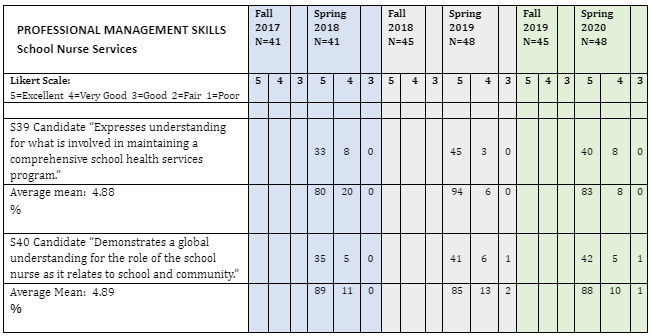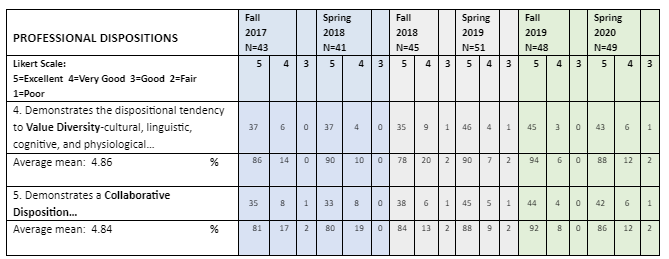AAQEP Accreditation
Standard 2 Aspect D
Standard 2: Program completers engage in professional practice in educational settings and show they have the skills and abilities to do so in a variety of additional settings and community/cultural contexts. Support Students’ growth in international and global perspectives.
In school nursing, global is meant to be the perspective outside of the boundaries of the class, school or district. A nurse with a global perspective is culturally sensitive, collaborative and knows that health conditions have no borders, or may be endemic in some areas. They advocate, educate, and innovate for the health and well-being of the whole community, whether it is in an international setting or in their own backyard. School Nurses investigate global areas in N184 and N185 Weekly Research questions in areas such as universal health care, school based health clinics, communicable disease/pandemic planning and immunization areas. The program provides links to National Health-Related information in the CANVAS learning platform resource area to introduce students to health promotion resources such as Centers for Disease Control and Prevention (CDC) and Healthy People 2020.
DATA Sources to be Introduced:
- Preceptor Checklist of Skills and Competencies-Professional Management Skills (Form P106/P206)
- Professional Dispositions (Form P104/P204)
- N184 School Nurse Seminar: Key assignment-Cultural Book Report
- “The Spirit Catches You and You Fall Down”, by Anne Fadiman.
Data Source 1
Midterm and Final Semester Fieldwork Evaluation, Preceptor Checklist of Skills and
Competencies- Professional Management Skills (Form P106/206)
The first measure is the Fall semester (Elementary) and Spring semester (Secondary)
Fieldwork Evaluation, Preceptor Checklist of Skills and Competencies (P106/206)-Professional
Management, used by preceptors to evaluate candidates in their fieldwork knowledge
at two points.
Perspective: Preceptor
Specific Items Used for Analysis:
Items supporting students’ growth in global and international perspectives:
- Item 1: S40 Candidate “Demonstrates a global understanding for the role of the school nurse as it relates to school and community.” Example skills from the preceptor checklist: E3, E6, E8 and E10, S4, S10, S21, S27.
- Item 2: S39 Candidate “Expresses understanding for what is involved in maintaining
a comprehensive school health services program.” Example skills from the preceptor
checklist:
S19, S24, S27, S30.
Definition of Success:
Candidates are rated on a 5-point Likert scale from 5 “Excellent” to 1 “Poor”. The
program goal is candidates will achieve an Excellent or Very Good rating.

Summary of Findings
From 2017 to 2020:
- S39 Data from the Program Management indicators show preceptors rated 100% of the
candidates Excellent or Very Good on the ability to understand a comprehensive school
health services program.
S39 Mean ranged from 4.80 to 4.93 with an average of 4.88. - S40 data shows preceptors rated 98% of candidates as having a global understanding
for the role of the school nurse as it relates to school and community. Two candidates
were rated Good and zero candidates rated Fair or Poor.
S40 Mean ranged from 4.85 to 4.93 with an average of 4.89.
Analysis and Interpretation
The Professional Management indicators demonstrate school nurse preceptors feel the
school nurse credential program has prepared SNSC Program completers to engage in
professional practice in educational settings and show they have the skills and abilities
to do so in a variety of additional settings and community/cultural contexts using
a global perspective outside of the school setting.
Data Source 2
Professional Dispositions
The second measure is used by practicum preceptors to measure candidates' dispositions
or behaviors using a 5-point Likert Scale. Preceptors are asked to: “Circle the number
on the scale that reflects the most accurate description of student application of
dispositions.” Items Include:
- Item #4 “Candidate demonstrates the dispositional tendency to value diversity-cultural, linguistic, cognitive, and physiological (This disposition is critical to the differentiating instruction and creating psychologically and physically safe helping environments.”)
- Item #5: “Candidate demonstrates a Collaborative Disposition (The school nurse must collaborate/communicate meaningfully/effectively with other professionals, school site personnel, members of the community and families in order to effectively meet the health care needs of children/professions.”)

Summary of Findings
From 2017 to 2020:
Standard 4: 99% of candidates received an Excellent or Very Good in the ability to
value diversity.
Three candidates were perceived as Good and zero candidates perceived as fair or poor.
- Mean scores ranged from 4.75 to 4.93 with an average of 4.86.
Standard 5: 96% of candidates received an Excellent or Very Good in the ability to
collaborate.
Four candidates were perceived as Good and zero candidates were rated fair or poor.
- Mean scores ranged from 4.79 to 4.91 with an average of 4.84.
Analysis and Interpretation
Preceptors rate candidates on diversity areas overwhelmingly positive. Indicators
#4 and #5 show that 96% of candidates engage in culturally responsive educational
practices with diverse learners and 99% do so in diverse cultural and socioeconomic
community contexts. This gives school nurses the ability to look beyond the school
and community to global and international areas and how they impact health. An example
is school nurse participation in the Department of Public Health Pandemic Preparedness
teams.
Data Source 3
Employer/Supervisor Survey of Program Effectiveness
The Employer/Supervisor Survey of Program Effectiveness is given to District Health
Services Administrators who supervise program candidates in the workplace. These aspects
look at how the program prepares candidates in assessment areas to improve and support
a student’s ability to learn. This is mailed out one year after a candidate completes
the SN program. Supervisors are asked to: “Rate the following program standards related
to the programs’ effectiveness in preparing professional school nurses.”
Perspective: Supervisors/Employers of Program Completers Candidates are rated on a 4-point Likert scale.
Specific Items Used for Analysis:
Items reviewed are:
- Program Standard #5: The program provides candidates with opportunities to further develop their understanding of the sociocultural context in which school nurses work. As part of these opportunities, candidates experience the range of diversity represented within the local community including culture, ethnicity, language, age, gender, gender identity, students with special needs, socioeconomic status and value systems.
Definition of Success: The SNSC program is rated on a 4-point Likert scale with 4 representing Excellent to 1 representing Poor. Our goal is supervisors will rate the program a minimum of 3.
| EMPLOYER/SUPERVISOR SURVEY OF PROGRAM EFFECTIVENESS | 2016 N=9 |
2020 N=13 |
||||
|---|---|---|---|---|---|---|
| Key:4=Excellent 3=Good 2=Fair 1=Poor | Excellent | Good | Fair | Excellent | Good | Fair |
| Program Standard 5: The Sociocultural Context of School Nursing | ||||||
| The program provides candidates with opportunities to further develop their understanding of the sociocultural context in which school nurses work. As part of these opportunities, candidates experience the range of diversity represented within the local community including culture, ethnicity, language, age, gender, gender identity, students with special needs, socioeconomic status and value systems. | 66% |
22% |
11% |
77% |
23% | 0% |
Summary of Findings
School Nurse Employers/Supervisors rated the School Nurse Services Credential Program
as 88% effective in 2016 in preparing candidates to further their understanding of
the school nurse role outside of sociocultural areas. Twelve percent of supervisors
rated the SNSC program as Fair.
In 2020, supervisors rated the SNSC Program in these areas 100% Excellent or Good.
There were zero candidates who were rated Poor in either 2016 or 2020.
Analysis and Interpretation
School Administrators/Employers gave the SNSC Program high marks with 88% to 100%
of candidates receiving an Excellent to Good rating. There were zero candidates who
rated Poor. The table shows evidence that employers perceive candidates of the program
received support in global and international areas. A significant increase in scores
marked Excellent from 2016 to 2020 is noted.
Data Source 4
Nursing 184 Key Assignment-Cultural Book Report
The School Nurse Services Credential Program has provided knowledge and hands-on application
in international and global areas. Research questions and discussion topics include
global and international areas in seminar and practicum courses. For example, researching
human trafficking, STD trends and issues about universal health insurance are current
topics. In Nursing 184 a key assignment is a cultural book report highlighting the
Hmong culture.
Book Report: Anne Fadiman, The Spirit Catches You and You Fall Down.
Purpose:
- To enhance the cultural competence of school nursing and gain insight into the diversity of cultural practices and the implications of cultural influences on health care beliefs and practices.
- To explore what cultural practices might be implemented in the school setting to assist students and families.
Rationale:
The hope is that, by providing opportunities for candidates to broaden their understanding
of diverse perspectives and experiences, they will be better equipped to interact
with students and families in their role as school nurses.
Definition of Success:
The goal is for all students to achieve a 3.00 GPA to pass seminar and practicum
courses. It is evident from the mean grades that candidates have achieved this goal
with the combined mean GPA for N184 as 3.80 and all seminar and practicum courses
achieving a mean GPA of 3.84.
Student GPA in courses that support growth in international and global perspectives.
| Mean GPA | 2017 | 2018 | 2019 | Combined |
|---|---|---|---|---|
| Nursing 184-School Nurse Seminar I | 3.71 N=47 |
3.79 N=52 |
3.92 N=48 |
3.04 |
| Nursing 185-School Nurse Seminar II | 3.71 N=45 |
3.83 N=48 |
3.90 N=48 |
3.81 |
| Nursing 186-School Nurse Practicum I | 3.83 N=47 |
3.84 N=51 |
3.94 N=49 |
3.87 |
| Nursing 187-School Nurse Practicum II | 3.93 N=44 |
3.88 N=51 |
3.94 N=50 |
3.91 |
Student GPA for Cultural Book Report
| Mean GPA | 2018 | 2019 | 2020 | Combined GPA |
|---|---|---|---|---|
| Nursing 184-Cultural Book Report | 96.5% N=47 |
96% N=52 |
100% N=48 |
97.5%=A |
Analysis of Standard 2d Findings
Evidence from the preceptor rated Program Management Survey and Professional Dispositions
highly support indicators that the program provides candidates with opportunities
to further develop their understanding of the sociocultural context in which school
nurses work in global and international areas. Preceptors rated candidate Professional
Dispositions as extremely high for the ability to engage in culturally responsive
educational practices with diverse learners in diverse cultural and socioeconomic
community contexts. In addition, employers give the program excellent and good ratings
in the ability to integrate cultural awareness in Health and Wellness Programs. Assignments
such as a cultural book report and discussion items on multicultural areas provide
opportunities for candidates to reflect on and apply this information in culturally
responsive health programs. In 2020, Pandemic Preparedness and COVID-19 preventative
education, community contact tracing and community immunization clinics were experienced
in practicum courses.